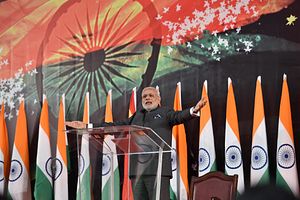One year is a long time in politics. No one understands that better than India’s prime minister, Narendra Modi. In 2014, he won with an historic landslide at the polls, decimating the Congress Party, which was left with just 44 of the 545 seats in the Lok Sabha. In the first few months after that triumph, the country was in complete awe of Modi and his Bharatiya Janata Party (BJP), and it looked as though Congress didn’t have much of a future.
Twelve months later, Modi’s aura of invincibility has disappeared. The BJP has not won a single by-election since coming to power last May, suffering its biggest humiliation in Delhi elections in February, conceding defeat to the upstart Aam Aadmi Party (AAP). In Uttar Pradesh, a crucial state, where the party won 71 out 80 parliamentary seats, it has failed to win even a single seat in 16 by-elections. It’s the same story in West Bengal, the eastern Indian state, where the BJP was crushed in civic elections last month.
With Modi’s political stock falling, Congress has found a new lease on life. The party is punching well above its parliamentary strength, and its leader, Rahul Gandhi, has begun to draw traction, particularly after he opposed a controversial land acquisition bill. Another surprising development is open criticism of Modi from former supporters.
Arun Shourie, a BJP member, has called Modi’s economic policy “directionless.” He served as India’s Finance Minister between 1998 and 2004. “The government is more concerned with managing headlines than putting policies in place,” Shourie said in an interview last month. “[BJP] is stuck with a scrambled set of jigsaw pieces and has no sense of how to put them together.”
Social activist Madhu Kishwar’s attacks on Modi were particularly surprising. She blames Modi his lack of vision, especially on education and economic development. That’s coming from someone, who not long ago, went out of her way to justify the polarizing prime minister.
Mihir Sharma of the Business Standard writes that Modi is wasting his parliamentary majority by not taking bold decisions. “The government’s confusion reflects his own lack of direction,” says Sharma. The author of the recent book “Restart: The Last Chance for the Indian Economy,” Sharma adds that “we are still waiting for the first – the first! – legislative change entirely driven by Mr Modi’s own vision for India’s future. The point of 282 was that it gave a government the power to change the rules of the game. That is all a parliamentary majority in fact does. This has not happened, yet. Till that happens, no real revival will emerge.”
The initial years of any new government are considered a crucial time, when far reaching decisions can be made. But the BJP, which came riding the high horses of expectation, has been a disappointment for both the critics and supporters.
On Modi’s core campaign promise, fixing the economy, he hasn’t had much success. The corporate and middle classes of Indian society had hoped that the BJP would launch another wave of economic reforms. But despite boasting 282 of the 545 seats in the Lok Sabha, the government has shied away from making any radical decisions. That has disappointed both critics and supporters, who had hoped to see the economic forecast improve in India.
But Modi’s political personality, not his reforms, have garnered headlines in his first year, as opponents have raised questions about the centralization of power and about the Prime Minister’s self-obsessed behavior. Delhi’s political circles have been abuzz with the news of how the files are piling up in the Prime Minister’s Office (PMO) and how even an appointment for a personal secretary to a minister has to be cleared by the PMO—something which has never happened before in India.
Modi’s political mettle is also being tested, with elections in Bihar coming up in September. If the BJP fails to form a government there, the prime minister’s credibility would take a beating. The parameters by which to judge the Modi-led regime in Delhi can not be the same as they were for the previous regime. His was a historic mandate. For the first time a non-Congress party won a majority in the lower house of parliament on its own. Modi successfully sold a dream to the nation and people put their faith in him. Many voted for him despite having strong reservations about his political past because he promised to deliver a new future. Therefore, Modi cannot hide behind excuses and cannot get away with a mediocre performance as prime minister.
With the opposition showing more fight than expected, that would make it difficult for Modi to make tough economic decisions. His bold foreign policy initiatives will mean little if he gets sucked into domestic political skirmishes. Either way, the next few months for the prime minister look to be bumpy.

































